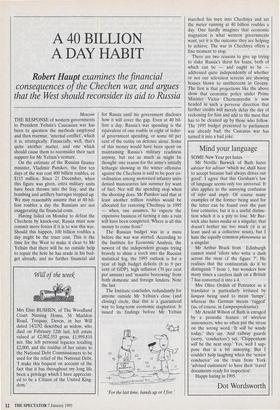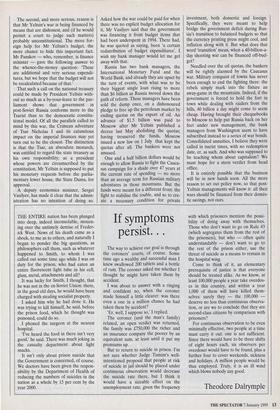A 40 BILLION A DAY HABIT
Robert Haupt examines the financial
consequences of the Chechen war, and argues that the West should reconsider its aid to Russia
Moscow THE RESPONSE of western governments to President Yeltsin's Caucasian war has been to question the methods employed and then murmur, 'internal conflict', which it is, strategically. Financially, well, that's quite another matter, and one which should cause them to reconsider their tacit support for Mr Yeltsin's venture.
On the estimate of the Russian finance minister, Vladimir Panskov, the first ten days of the war cost 400 billion roubles, or $115 million. Since 21 December, when this figure was given, extra military units have been thrown into the fray, and the bombing and artillery barrages stepped up. We may reasonably assume that at 40 bil- lion roubles a day the Russians are not exaggerating the financial costs.
Having failed on Monday to defeat the Chechens by knock-out, Russia must now commit more forces if it is to win this war. Should this happen, 100 billion roubles a day might be the truer cost. This is the time for the West to make it clear to Mr Yeltsin that there will be no outside help to repair the hole he has made in his bud- get already, and no further financial aid
(Will of the week
Mrs Elsie BUSHEN, of The Woodland Court Nursing Home, 56 Marldon Road, Torquay, Devon, in her Will dated 14/2/92 described as widow, who died on February 12th last, left estate valued at £2,002,353 gross, £1,999,810 net. She left personal legacies totalling £2,000, and the residue of her estate to the National Debt Commissioners to be used for the relief of the National Debt. `I make this bequest on account of the fact that it has throughout my long life been a privilege which I have appreciat- ed to be a Citizen of the United King- dom.' for Russia until his government discloses how it will cover the gap. Even at 40 bil- lion a day, Russia's war spending is the equivalent of one rouble in eight of feder- al government spending, or some 60 per cent of the outlay on defence alone. Some of this money would have been spent on maintaining Russia's military readiness anyway, but not as much as might be thought: one reason for the army's initially lethargic showing in the winter offensive against the Chechens is said to be poor co- ordination among motorised infantry units denied manoeuvres last summer for want of fuel. Nor will the spending stop when' the shooting does. Mr Panskov said that at least another trillion roubles would be allocated for restoring Chechnya in 1995 — when, one assumes, he expects the expensive business of turning it into a ruin will have been completed. Where is all this money to come from?
The Russian budget was in a mess before the war was started. According to the Institute for Economic Analysis, the newest of the independent groups trying bravely to shine a torch into the Russian statistical fog, the 1995 outlook is for a year of high budget deficits (8 to 9 per cent of GDP), high inflation (70 per cent per annum) and 'massive borrowing' from both domestic and foreign lenders. Note the last.
The Institute concludes, redundantly for anyone outside Mr Yeltsin's close (and closing) circle, that this is a guaranteed way to long-term economic stagnation. It issued its findings before Mr Yeltsin `For the last time, hands up or I fire.' marched his men into Chechnya and set the meter running at 40 billion roubles a day. One hardly imagines that economic stagnation is what western governments want, yet it is the outcome they are helping to achieve. The war in Chechnya offers a fine moment to stop.
There are two reasons to give up trying to slake Russia's thirst for loans, both of which can be — and ought to be — addressed quite independently of whether or not our television screens are showing houses blown to smithereens in Grozny. The first is that projections like the above show that economic policy under Prime Minister Victor Chernomyrdin is now headed in such a perverse direction that further credits will merely delay the day of reckoning for him and add to the mess that has to be cleaned up by those who follow. The 1995 budget presented to parliament was already bad; the Caucasus war has turned it into a bad joke. The second, and more serious, reason is that Mr Yeltsin's war is being financed by means that are dishonest, and (if he would permit a court to judge such matters) probably unconstitutional. The more for- eign help for Mr Yeltsin's budget, the more chance to hide this important fact. Mr Panskov — who, remember, is finance minister — gave the following answer to the whence-the-money question: `These are additional and very serious expendi- tures, but we hope that the budget will not be recalculated because of that.'
That such a call on the national treasury could be made by President Yeltsin with- out so much as a by-your-leave to the par- liament shows that government in post-Soviet Russia conforms more to the Tsarist than to the democratic constitu- tional model. Of all the parallels called to mind by this war, the Crimean adventure of Tsar Nicholas I and its calamitous impact on the imperial finances may yet turn out to be the closest. The distinction is that the Tsar, an absoulute monarch, was entitled to regard the state treasury as his own responsibility; as a president whose powers are circumscribed by the constitution, Mr Yeltsin is supposed to put his monetary requests before the parlia- mentary lower house, the State Duma, for approval.
A deputy economics minister, Sergei Vasilyev, has made it clear that the admin- istration has no intention of doing so. Asked how the war could be paid for when there was no explicit budget allocation for it, Mr Vasilyev said that the government was financing it from budget items that had been underspent in 1994. There had, he was quoted as saying, been 'a certain redistribution of budget expenditures'. I wish my bank manager would let me get away with that.
Russia has two bank managers, the International Monetary Fund and the World Bank, and already they are upset by the turn of events, with what was to be their biggest single loan rising to more than $6 billion as Russia moved down the path of reform. These managers have been sold the dump once, on a dishonoured pledge to free up the petroleum market by ending quotas on the export of oil. An advance of $1.5 billion was paid to Moscow after Mr Yeltsin published a decree last May abolishing the quotas; having trousered the funds, Moscow issued a new law on 1 July that kept the quotas after all. The bankers were not amused.
One and a half billion dollars would be enough to allow Russia to fight the Cauca- sus campaign for a shade over 47 years at the current rate of spending — no more than an average term for Russian military adventures in those mountains. But the funds were meant for a different front: the fight to stabilise the rouble, and so to cre- ate a necessary condition for private investment, both domestic and foreign. Specifically, they were meant to help bridge the government deficit during Rus- sia's transition to balanced budgets so that the currency printing press might cool, and inflation along with it. But what does that word 'transition' mean, when a 40-billion-a- day shooting war can be financed off-bud- get?
Needled over the oil quotas, the bankers will be rightly alarmed by the Caucasus war. Military conquest of towns has never been enough to end the fighting there: the rebels simply mark into the fixture an away-game in the mountains. Indeed, if the government is forced to hold the fort in town while dealing with raiders from the hills, 40 billion a day might come to seem cheap. Having brought their chequebooks to Moscow to help put Russia back on her feet under new management, the bank managers from Washington seem to have subscribed instead to a series of war bonds. Consolidated annuities, I believe they were called in tsarist times, with no redemption date, er, as such. And who was supposed to be teaching whom about capitalism? We must hope for a stern verdict from head office.
It is entirely possible that the business will be in new hands soon. All the more reason to set out policy now, so that post- Yeltsin managements will know it: all their wars should be financed from their domes- tic savings, not ours.



















































 Previous page
Previous page